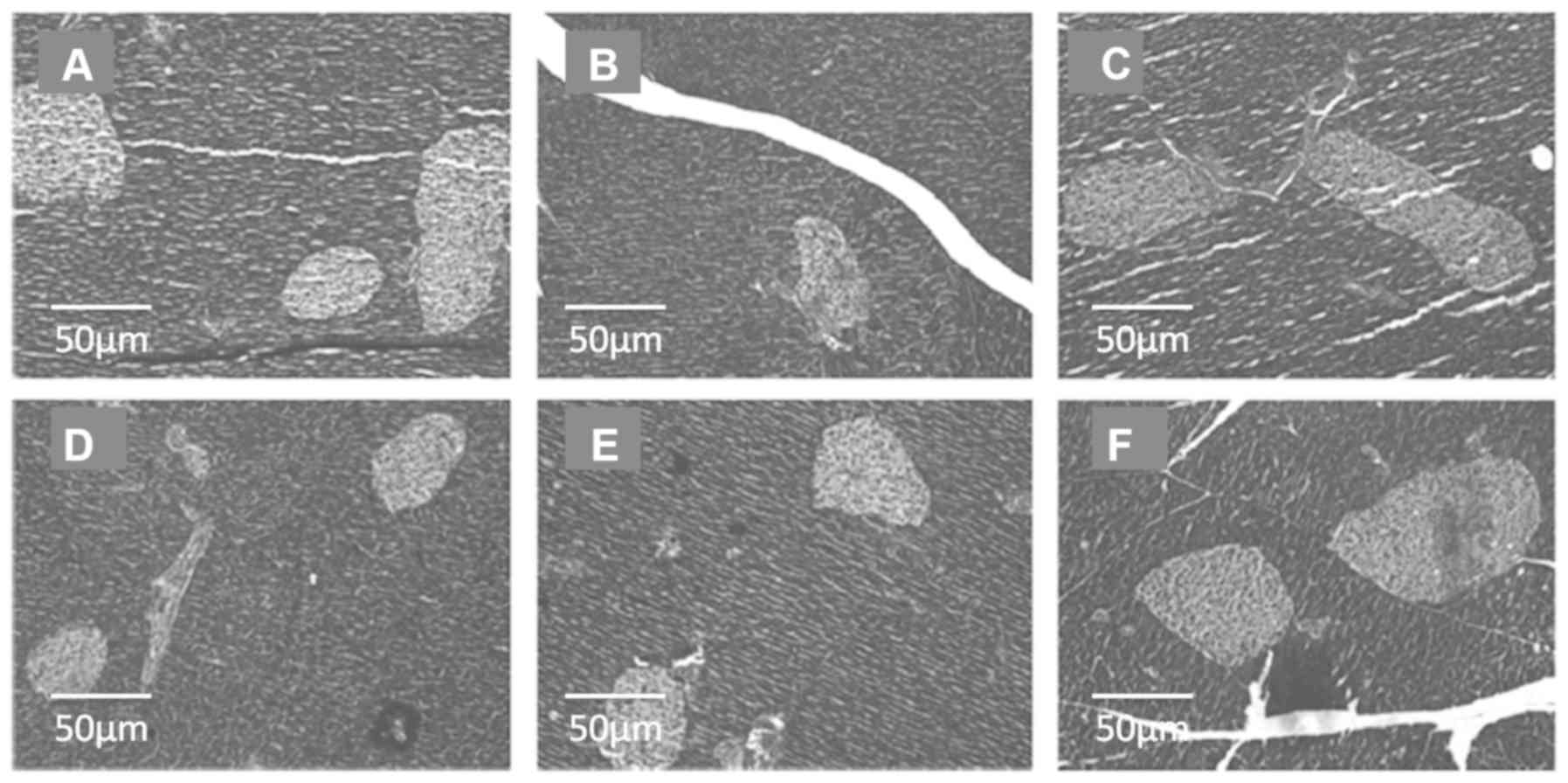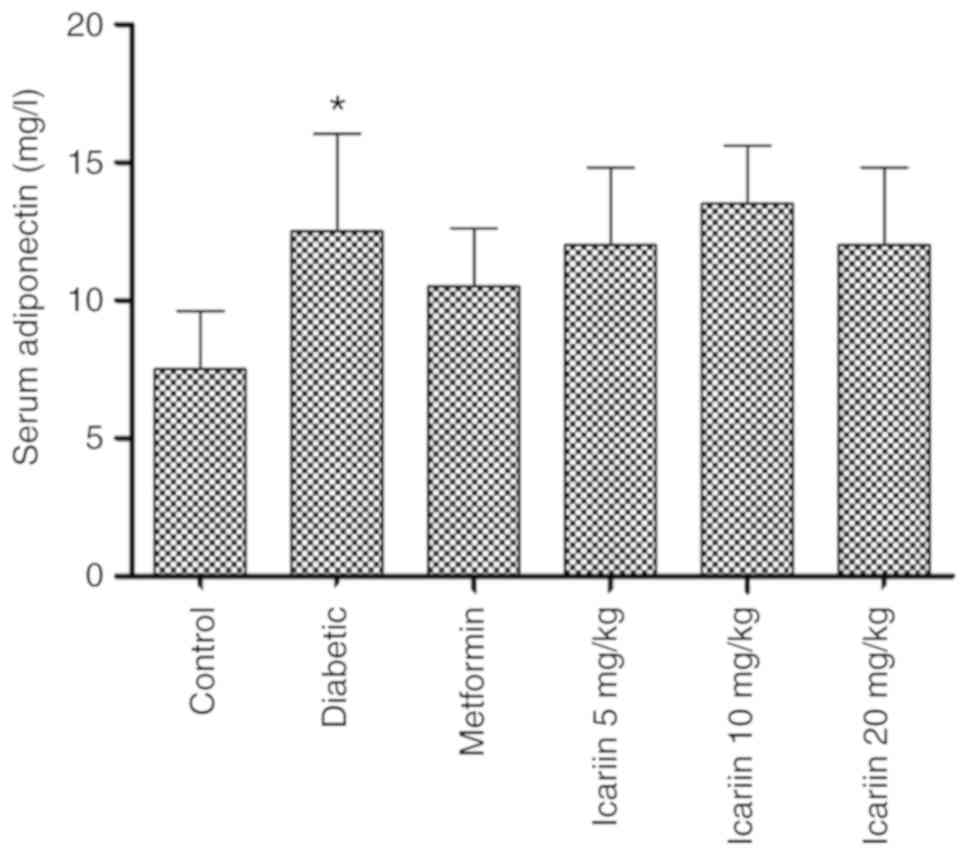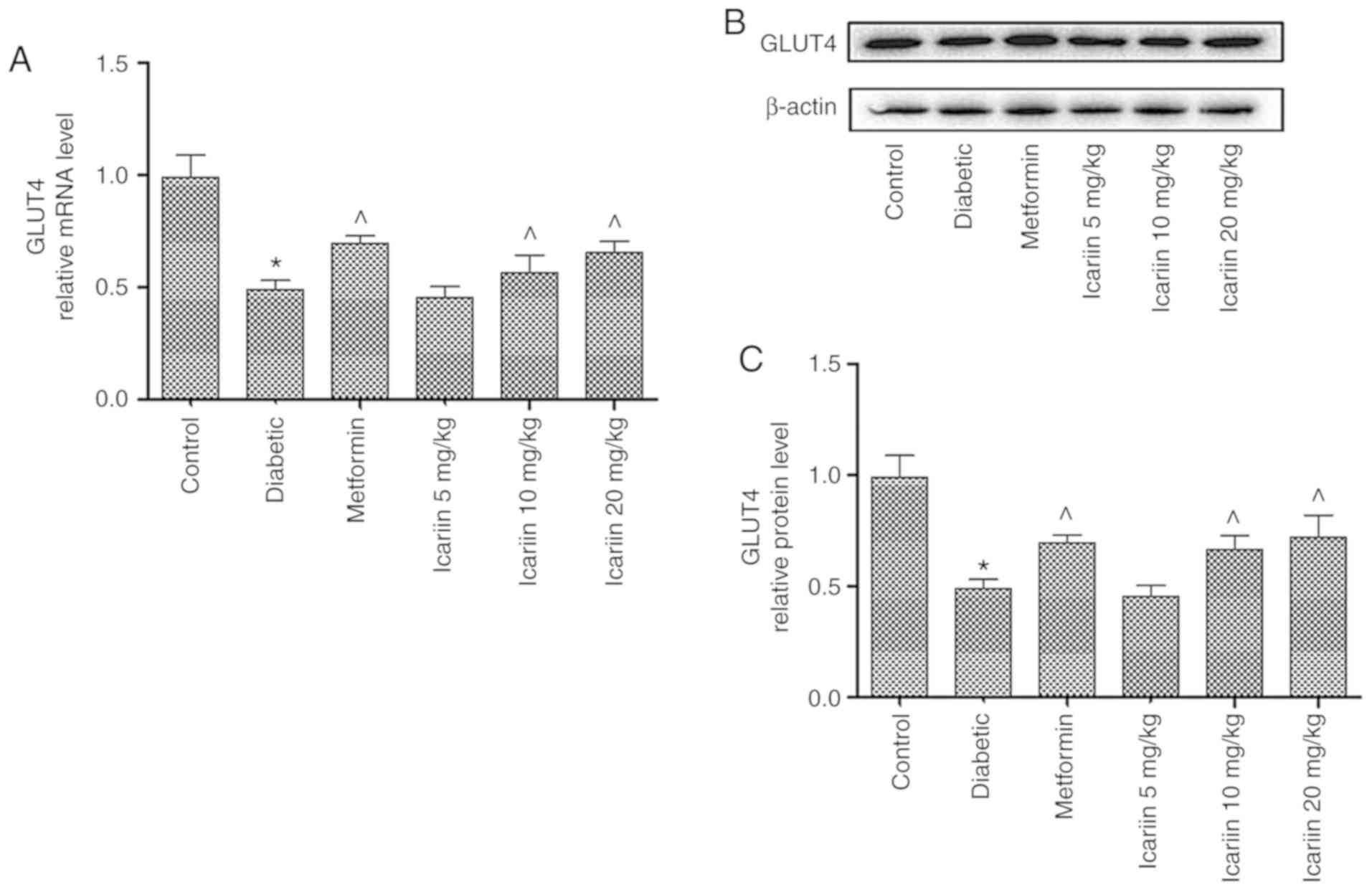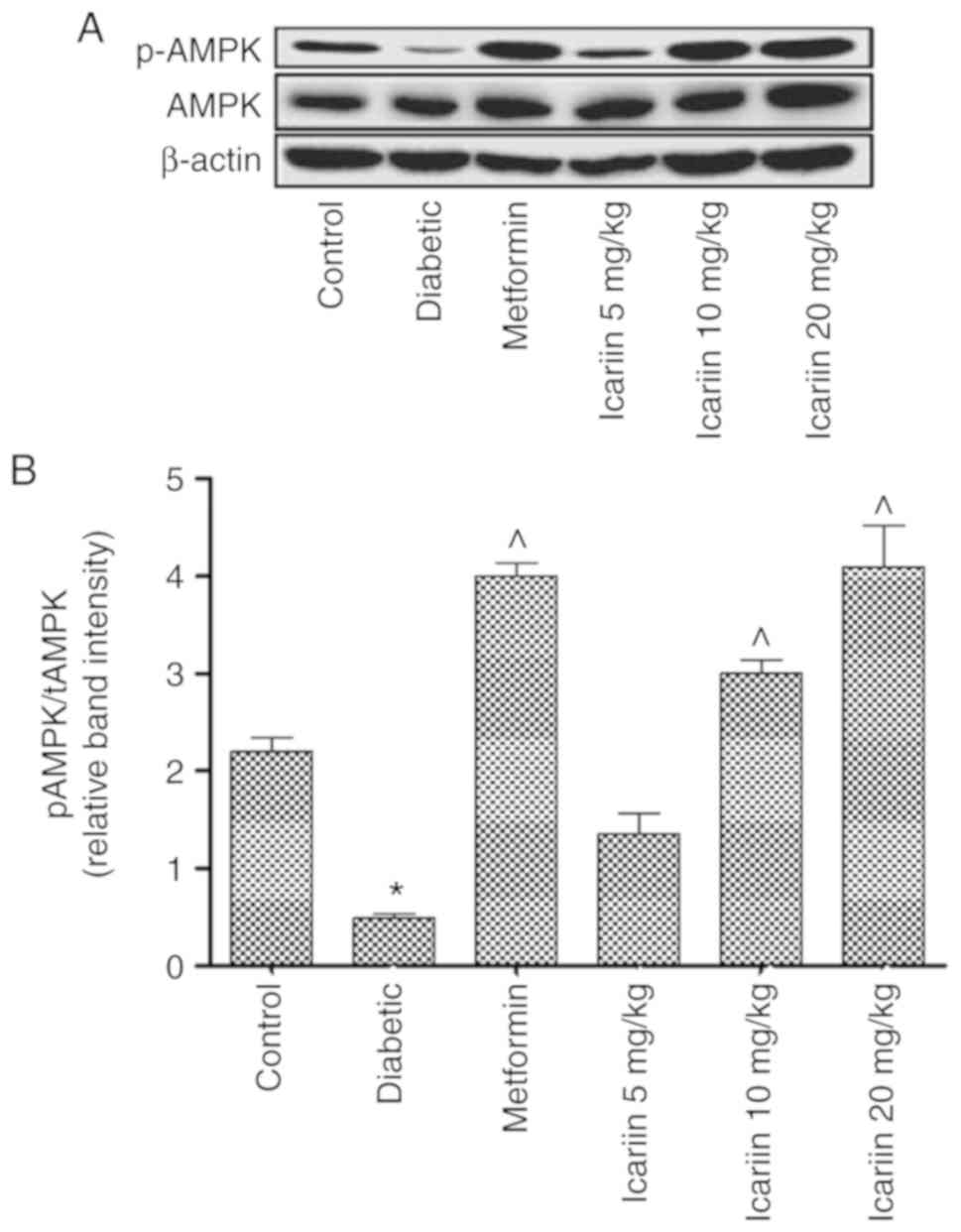|
1
|
Ogurtsova K, da Rocha Fernandes JD, Huang
Y, Linnenkamp U, Guariguata L, Cho NH, Cavan D, Shaw JE and
Makaroff LE: IDF Diabetes Atlas: Global estimates for the
prevalence of diabetes for 2015 and 2040. Diabetes Res Clin Pract.
128:40–50. 2017.PubMed/NCBI View Article : Google Scholar
|
|
2
|
Constantin RP, Constantin RP, Bracht A,
Yamamoto NS, Ishii-Iwamoto EL and Constantin J: Molecular
mechanisms of citrus flavanones on hepatic gluconeogenesis.
Fitoterapia. 92:148–162. 2014.PubMed/NCBI View Article : Google Scholar
|
|
3
|
Li WL, Zheng HC, Bukuru J and De Kimpe N:
Natural medicines used in the traditional Chinese medical system
for therapy of diabetes mellitus. J Ethnopharmacol. 92:1–21.
2004.PubMed/NCBI View Article : Google Scholar
|
|
4
|
Hajiaghaalipour F, Khalilpourfarshbafi M
and Arya A: Modulation of glucose transporter protein by dietary
flavonoids in type 2 diabetes mellitus. Int J Biol Sci. 11:508–524.
2015.PubMed/NCBI View Article : Google Scholar
|
|
5
|
Xiong W, Ma X, Wu Y, Chen Y, Zeng L, Liu
J, Sun W, Wang D and Hu Y: Determine the structure of
phosphorylated modification of icariin and its antiviral activity
against duck hepatitis virus A. BMC Vet Res. 11(205)2015.PubMed/NCBI View Article : Google Scholar
|
|
6
|
He W, Sun H, Yang B, Zhang D and Kabelitz
D: Immunoregulatory effects of the herba Epimediia glycoside
icariin. Arzneimittelforschung. 45:910–913. 1995.PubMed/NCBI
|
|
7
|
Makarova MN, Pozharitskaya ON, Shikov AN,
Tesakova SV, Makarov VG and Tikhonov VP: Effect of lipid-based
suspension of Epimedium koreanum Nakai extract on sexual
behavior in rats. J Ethnopharmacol. 114:412–416. 2007.PubMed/NCBI View Article : Google Scholar
|
|
8
|
Xu HB and Huang ZQ: Vasorelaxant effects
of icariin on isolated canine coronary artery. J Cardiovasc
Pharmacol. 49:207–213. 2007.PubMed/NCBI View Article : Google Scholar
|
|
9
|
Zhou J, Wu J, Chen X, Fortenbery N,
Eksioglu E, Kodumudi KN, Pk EB, Dong J, Djeu JY and Wei S: Icariin
and its derivative, ICT, exert anti-inflammatory, anti-tumor
effects, and modulate myeloid derived suppressive cells (MDSCs)
functions. Int Immunopharmacol. 11:890–898. 2011.PubMed/NCBI View Article : Google Scholar
|
|
10
|
Chen YJ, Zheng HY, Huang XX, Han SX, Zhang
DS, Ni JZ and He XY: Neuroprotective effects of icariin on brain
metabolism, mitochondrial functions, and cognition in
triple-transgenic alzheimer's disease mice. CNS Neurosci Ther.
22:63–73. 2016.PubMed/NCBI View Article : Google Scholar
|
|
11
|
Qi MY, Kai-Chen Liu HR, Su YH and Yu SQ:
Protective effect of Icariin on the early stage of experimental
diabetic nephropathy induced by streptozotocin via modulating
transforming growth factor beta1 and type IV collagen expression in
rats. J Ethnopharmacol. 138:731–736. 2011.PubMed/NCBI View Article : Google Scholar
|
|
12
|
Xin H, Zhou F, Liu T, Li GY, Liu J, Gao
ZZ, Bai GY, Lu H and Xin ZC: Icariin ameliorates
streptozotocin-induced diabetic retinopathy in vitro and in vivo.
Int J Mol Sci. 13:866–878. 2012.PubMed/NCBI View Article : Google Scholar
|
|
13
|
Zhang ZB and Yang QT: The testosterone
mimetic properties of icariin. Asian J Androl. 8:601–605.
2006.PubMed/NCBI View Article : Google Scholar
|
|
14
|
Lu YF, Xu YY, Jin F, Wu Q, Shi JS and Liu
J: Icariin is a PPARα activator inducing lipid metabolic gene
expression in mice. Molecules. 19:18179–18191. 2014.PubMed/NCBI View Article : Google Scholar
|
|
15
|
Hossain MM, Mukheem A and Kamarul T: The
prevention and treatment of hypoadiponectinemia-associated human
diseases by up-regulation of plasma adiponectin. Life Sci.
135:55–67. 2015.PubMed/NCBI View Article : Google Scholar
|
|
16
|
El Husseny MW, Mamdouh M, Shaban S,
Ibrahim Abushouk A, Zaki MM, Ahmed OM and Abdel-Daim MM:
Adipokines: Potential therapeutic targets for vascular dysfunction
in type ii diabetes mellitus and obesity. J Diabetes Res.
2017(8095926)2017.PubMed/NCBI View Article : Google Scholar
|
|
17
|
Gao Q, Yao X and Zheng J: MiR-323 inhibits
prostate cancer vascularization through adiponectin receptor. Cell
Physiol Biochem. 36:1491–1498. 2015.PubMed/NCBI View Article : Google Scholar
|
|
18
|
Ye JM, Dzamko N, Hoy AJ, Iglesias MA, Kemp
B and Kraegen E: Rosiglitazone treatment enhances acute
AMP-activated protein kinase-mediated muscle and adipose tissue
glucose uptake in high-fat-fed rats. Diabetes. 55:2797–2804.
2006.PubMed/NCBI View Article : Google Scholar
|
|
19
|
Fujii N, Ho RC, Manabe Y, Jessen N, Toyoda
T, Holland WL, Summers SA, Hirshman MF and Goodyear LJ: Ablation of
AMP-activated protein kinase alpha2 activity exacerbates insulin
resistance induced by high-fat feeding of mice. Diabetes.
57:2958–2966. 2008.PubMed/NCBI View Article : Google Scholar
|
|
20
|
Richter EA and Ruderman NB: AMPK and the
biochemistry of exercise: Implications for human health and
disease. Biochem J. 418:261–275. 2009.PubMed/NCBI View Article : Google Scholar
|
|
21
|
Sakamoto K, McCarthy A, Smith D, Green KA,
Grahame Hardie D, Ashworth A and Alessi DR: Deficiency of LKB1 in
skeletal muscle prevents AMPK activation and glucose uptake during
contraction. EMBO J. 24:1810–1820. 2005.PubMed/NCBI View Article : Google Scholar
|
|
22
|
Sharma AX, Quittner-Strom EB, Lee Y,
Johnson JA, Martin SA, Yu X, Li J, Lu J, Cai Z, Chen S, et al:
Glucagon receptor antagonism improves glucose metabolism and
cardiac function by promoting AMP-mediated protein kinase in
diabetic mice. Cell Rep. 22:1760–1773. 2018.PubMed/NCBI View Article : Google Scholar
|
|
23
|
Na RS, Ma C, Liu QR, Wu LM, Zheng XL and
Liu ZW: Itraconazole attenuates hepatic gluconeogenesis and
promotes glucose uptake by regulating AMPK pathway. Exp Ther Med.
15:2165–2171. 2018.PubMed/NCBI View Article : Google Scholar
|
|
24
|
Lowell BB and Shulman GI: Mitochondrial
dysfunction and type 2 diabetes. Science. 307:384–387.
2005.PubMed/NCBI View Article : Google Scholar
|
|
25
|
James DE, Strube M and Mueckler M:
Molecular cloning and characterization of an insulin-regulatable
glucose transporter. Nature. 338:83–87. 1989.PubMed/NCBI View
Article : Google Scholar
|
|
26
|
Goodyear LJ and Kahn BB: Exercise, glucose
transport, and insulin sensitivity. Annu Rev Med. 49:235–261.
1998.PubMed/NCBI View Article : Google Scholar
|
|
27
|
Kraniou Y, Cameron-Smith D, Misso M,
Collier G and Hargreaves M: Effects of exercise on GLUT-4 and
glycogenin gene expression in human skeletal muscle. J Appl Physiol
(1985). 88:794–796. 2000.PubMed/NCBI View Article : Google Scholar
|
|
28
|
Cao S, Li B, Yi X, Chang B, Zhu B, Lian Z,
Zhang Z, Zhao G, Liu H and Zhang H: Effects of exercise on AMPK
signaling and downstream components to PI3K in rat with type 2
diabetes. PLoS One. 7(e51709)2012.PubMed/NCBI View Article : Google Scholar
|
|
29
|
Leturque A, Loizeau M, Vaulont S, Salminen
M and Girard J: Improvement of insulin action in diabetic
transgenic mice selectively overexpressing GLUT4 in skeletal
muscle. Diabetes. 45:23–27. 1996.PubMed/NCBI View Article : Google Scholar
|
|
30
|
Zhang Q, Xiao X, Zheng J, Li M, Yu M, Ping
F, Wang T and Wang X: Liraglutide protects cardiac function in
diabetic rats through the PPAα pathway. Biosci Rep, 2018 (Epub
ahead of print).
|
|
31
|
Ismail TA, Soliman MM and Nassan MA:
Molecular and immunohistochemical effects of metformin in a rat
model of type 2 diabetes mellitus. Exp Ther Med. 9:1921–1930.
2015.PubMed/NCBI View Article : Google Scholar
|
|
32
|
Wang X, Liu C, Xu Y, Chen P, Shen Y, Xu Y,
Zhao Y, Chen W, Zhang X, Ouyang Y, et al: Combination of
mesenchymal stem cell injection with icariin for the treatment of
diabetes-associated erectile dysfunction. PLoS One.
12(e0174145)2017.PubMed/NCBI View Article : Google Scholar
|
|
33
|
Du XX, Tao X, Liang S, Che JY, Yang S, Li
H, Chen JG and Wang CM: Hypoglycemic effect of acidic
polysaccharide from schisandra chinensis on T2D rats induced by
high-fat diet combined with STZ. Biol Pharm Bull. 42:1275–1281.
2019.PubMed/NCBI View Article : Google Scholar
|
|
34
|
Bahadoran Z, Mirmiran P and Azizi F:
Dietary polyphenols as potential nutraceuticals in management of
diabetes: A review. J Diabetes Metab Disord. 12(43)2013.PubMed/NCBI View Article : Google Scholar
|
|
35
|
Zhang Y, Zhen W, Maechler P and Liu D:
Small molecule kaempferol modulates PDX-1 protein expression and
subsequently promotes pancreatic β-cell survival and function via
CREB. J Nutr Biochem. 24:638–646. 2013.PubMed/NCBI View Article : Google Scholar
|
|
36
|
Kim DH, Jung HA, Sohn HS, Kim JW and Choi
JS: Potential of Icariin metabolites from Epimedium koreanum
Nakai as antidiabetic therapeutic agents. Molecules.
22:2017.PubMed/NCBI View Article : Google Scholar
|
|
37
|
Yamauchi T, Kamon J, Waki H, Terauchi Y,
Kubota N, Hara K, Mori Y, Ide T, Murakami K, Tsuboyama-Kasaoka N,
et al: The fat-derived hormone adiponectin reverses insulin
resistance associated with both lipoatrophy and obesity. Nat Med.
7:941–946. 2001.PubMed/NCBI View
Article : Google Scholar
|
|
38
|
Nie JM and Li HF: Metformin in combination
with rosiglitazone contribute to the increased serum adiponectin
levels in people with type 2 diabetes mellitus. Exp Ther Med.
14:2521–2526. 2017.PubMed/NCBI View Article : Google Scholar
|
|
39
|
Adibian M, Hodaei H, Nikpayam O, Sohrab G,
Hekmatdoost A and Hedayati M: The effects of curcumin
supplementation on high-sensitivity C-reactive protein, serum
adiponectin, and lipid profile in patients with type 2 diabetes: A
randomized, double-blind, placebo-controlled trial. Phytother Res.
33:1374–1383. 2019.PubMed/NCBI View Article : Google Scholar
|
|
40
|
Nakajima T, Yokota T, Shingu Y, Yamada A,
Iba Y, Ujihira K, Wakasa S, Ooka T, Takada S, Shirakawa R, et al:
Impaired mitochondrial oxidative phosphorylation capacity in
epicardial adipose tissue is associated with decreased
concentration of adiponectin and severity of coronary
atherosclerosis. Sci Rep. 9(3535)2019.PubMed/NCBI View Article : Google Scholar
|
|
41
|
Tumminia A, Vinciguerra F, Parisi M,
Graziano M, Sciacca L, Baratta R and Frittitta L: Adipose tissue,
obesity and adiponect in: Role in endocrine cancer risk. Int J Mol
Sci. 20(pii: E2863)2019.PubMed/NCBI View Article : Google Scholar
|
|
42
|
Zeng F, Shi J, Long Y, Tian H, Li X, Zhao
AZ, Li RF and Chen T: Adiponectin and endometrial cancer: A
systematic review and meta-analysis. Cell Physiol Biochem.
36:1670–1678. 2015.PubMed/NCBI View Article : Google Scholar
|
|
43
|
Duca FA, Côté CD, Rasmussen BA,
Zadeh-Tahmasebi M, Rutter GA, Filippi BM and Lam TK: Metformin
activates a duodenal Ampk-dependent pathway to lower hepatic
glucose production in rats. Nat Med. 21:506–511. 2015.PubMed/NCBI View Article : Google Scholar
|
|
44
|
Kurth-Kraczek EJ, Hirshman MF, Goodyear LJ
and Winder WW: 5' AMP-activated protein kinase activation causes
GLUT4 translocation in skeletal muscle. Diabetes. 48:1667–1671.
1999.PubMed/NCBI View Article : Google Scholar
|
|
45
|
Farzaei MH, Singh AK, Kumar R, Croley CR,
Pandey AK, Coy-Barrera E, Kumar Patra J, Das G, Kerry RG,
Annunziata G, et al: Targeting inflammation by flavonoids: Novel
therapeutic strategy for metabolic disorders. Int J Mol Sci.
20:2019.PubMed/NCBI View Article : Google Scholar
|


















